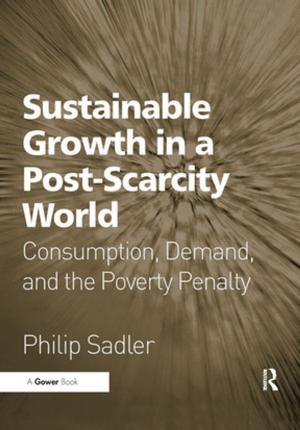Out of the Present Crisis
Rediscovering Improvement in the New Economy
Nonfiction, Health & Well Being, Medical, Reference, Administration, Business & Finance, Industries & Professions, Quality Control, Management & Leadership, Management Science| Author: | Terence T. Burton | ISBN: | 9781466566866 |
| Publisher: | Taylor and Francis | Publication: | May 21, 2012 |
| Imprint: | Productivity Press | Language: | English |
| Author: | Terence T. Burton |
| ISBN: | 9781466566866 |
| Publisher: | Taylor and Francis |
| Publication: | May 21, 2012 |
| Imprint: | Productivity Press |
| Language: | English |
Today, organizations have achieved an overall failure rate above 80 percent with Lean, Six Sigma, Lean Six Sigma, and continuous improvement in general. This is certainly not due to a shortage of books, consultants, and other online resources about the methodologies and tools, or the success stories of Toyota and others. However, it is due to a shortage of knowledge and practice about the most critical success factors of improvement: leadership, sustaining infrastructure, behavioral and cultural transformation, and now emerging technology. These factors produce 90 percent of the success with continuous and sustainable improvement; the methodologies and tools represent an irrelevant 10 percent. For decades, most organizations have focused on this quick and easy, irrelevant 10 percent through an endless series of fad, in-vogue improvement programs as they attempt to mimic the best-in-class practices of the most successful organizations.
Out of the Present Crisis: Rediscovering Improvement in the New Economy is the contemporary version of Deming’s famous 1982 book, "Out of the Crisis." The author builds a solid case for organizations to aggressively pursue the next generation of systematic and sustainable improvement through a combined strategy of Deming’s back-to-basics, innovation and breakthrough thinking, integration of emerging and enabling technology, and adaptive improvement across diverse environments and industries. The book’s practical, pragmatic style is backed up by many real world examples and personal experiences.
If you're looking for another book about Lean or Six Sigma "tools" this is not it. But it is a book about how to achieve lasting success by making improvement the cultural standard of excellence and living code of conduct in organizations. This popular book provides executives with an up-to-date and proven reference guide for rediscovering successful systematic and sustainable improvement in today’s economy. The author demonstrates the importance of viewing improvement as a continuous manageable "process" and covers the most critical success factors of leadership, sustaining infrastructure, behavioral and cultural transformation, and emerging technology in a practical, no-nonsense, "how-to-do" style. The book provides specific guidance for all industries including public and private corporations, hospitals, financial services, airlines, municipalities, and federal, state, and local governments.
Today, organizations have achieved an overall failure rate above 80 percent with Lean, Six Sigma, Lean Six Sigma, and continuous improvement in general. This is certainly not due to a shortage of books, consultants, and other online resources about the methodologies and tools, or the success stories of Toyota and others. However, it is due to a shortage of knowledge and practice about the most critical success factors of improvement: leadership, sustaining infrastructure, behavioral and cultural transformation, and now emerging technology. These factors produce 90 percent of the success with continuous and sustainable improvement; the methodologies and tools represent an irrelevant 10 percent. For decades, most organizations have focused on this quick and easy, irrelevant 10 percent through an endless series of fad, in-vogue improvement programs as they attempt to mimic the best-in-class practices of the most successful organizations.
Out of the Present Crisis: Rediscovering Improvement in the New Economy is the contemporary version of Deming’s famous 1982 book, "Out of the Crisis." The author builds a solid case for organizations to aggressively pursue the next generation of systematic and sustainable improvement through a combined strategy of Deming’s back-to-basics, innovation and breakthrough thinking, integration of emerging and enabling technology, and adaptive improvement across diverse environments and industries. The book’s practical, pragmatic style is backed up by many real world examples and personal experiences.
If you're looking for another book about Lean or Six Sigma "tools" this is not it. But it is a book about how to achieve lasting success by making improvement the cultural standard of excellence and living code of conduct in organizations. This popular book provides executives with an up-to-date and proven reference guide for rediscovering successful systematic and sustainable improvement in today’s economy. The author demonstrates the importance of viewing improvement as a continuous manageable "process" and covers the most critical success factors of leadership, sustaining infrastructure, behavioral and cultural transformation, and emerging technology in a practical, no-nonsense, "how-to-do" style. The book provides specific guidance for all industries including public and private corporations, hospitals, financial services, airlines, municipalities, and federal, state, and local governments.















